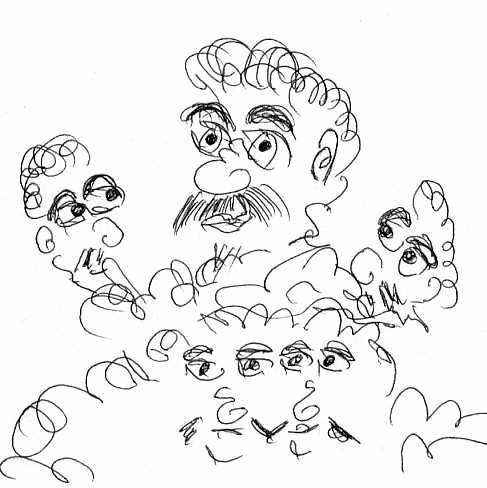Notebook
Where Writers Get Their Ideas
Since I have no ideas for a column this month, I think this is a good time to talk about where writers get their ideas. This is a familiar question. It is very easy to imagine a writer sitting in the middle of a huge auditorium, surrounded by adoring fans eager to know where he gets his ideas. It is even easier to imagine a writer sitting in the same auditorium all by himself because he has no fans and no one cares. But that doesn’t mean we shouldn’t discuss where he gets his ideas. Ideas are exciting, even when writers themselves are extremely dull, like me.
Where, then, do ideas come from? Even more to the point, what is an idea? Well, in its crudest form, an idea is something that occurs to a person when he is low on cash. This kind of idea usually takes the form of, “If I don’t get a job soon, I will starve. Say, I think I’ll get a job.” And then when he goes out and finds that there are no jobs, he gets another idea: “I guess I’ll rob a bank.” Unless, of course, he has a relative or friend who still speaks to him, in which case he can ask him for money. But you know how relatives and friends can be. Often, they have their own ideas. One of the most popular is, “Let’s see. Last time I gave him money, he didn’t pay me back. So I think I’ll tell him to go begging somewhere else.”
Now, if this seems a bit prosaic, that’s because it is. But it is important to note that ideas of this nature directly apply to writers, because most of us are notoriously low on cash. And the reason we are low on cash is because we systematically ignore anything that resembles common sense. For instance, I was once told by my father that being a writer is a great way to starve, and that I’d be far better off driving a bus. It was a practical statement, uttered in good faith. Being a writer, though, I responded by writing a story about a bus driver who yearned to be a writer, and who, when he finally became a writer, starved. When I tried to sell the story, no one was interested. When I tried to give it away to several dozen magazine editors, one or two of them said, “Nice idea, but our publication is full up at the moment.”
This, of course, gave me another idea. If the editors didn’t like my story, why not send them twenty or thirty more? And so I began to feverishly write and send stories to the same editors who had rejected my story about the bus driver who wanted to be a writer. The first one I wrote was about a writer who wanted to be a bus driver. But no one would hire the poor guy because, being a writer, he had let himself go to seed and so didn’t quite fit the bus driver image.
The second story I wrote was about a writer and a bus driver who decided to swap identities. In that story, the writer became a bus driver and starved, and the bus driver became a writer and wrote a best-seller. This gave me yet another idea. If a bus driver could write a best-seller, why couldn’t a plumber? And so I wrote a story about a bus driver who became a plumber, only to discover he didn’t like banging on pipes and crawling around under people’s houses, and after thinking about it for several years bought a typewriter, learned how to type, and wrote a best-seller.
Finally, after writing and sending many similar stories, I heard from one of the editors. “I don’t know where you get your ideas,” he scribbled at the bottom of a rejection slip, “but I do wish you’d stop.”
Flattered by his personal response, I was immediately struck with another idea, which I quickly jotted down in my notebook: “Figure out where good ideas come from, and you’ll make a million.” I have been working on that idea ever since.

Also by William Michaelian
POETRY
Winter Poems
ISBN: 978-0-9796599-0-4
52 pages. Paper.
——————————
Another Song I Know
ISBN: 978-0-9796599-1-1
80 pages. Paper.
——————————
Cosmopsis Books
San Francisco
Signed copies available
Main Page
Author’s Note
Background
A Listening Thing
Among the Living
No Time to Cut My Hair
One Hand Clapping
Songs and Letters
Collected Poems
Early Short Stories
Armenian Translations
Cosmopsis Print Editions
Interviews
News and Reviews
Highly Recommended
Let’s Eat
Favorite Books & Authors
Useless Information
Conversation
Flippantly Answered Questions
E-mail & Parting Thoughts
Old Notes
Current Entry